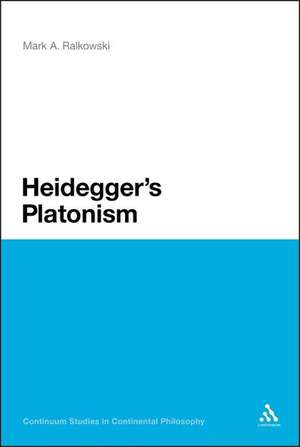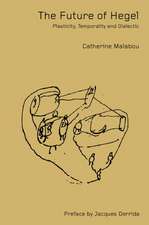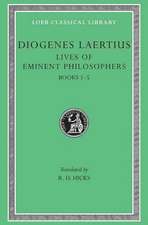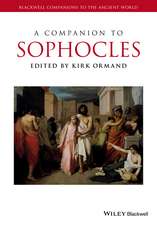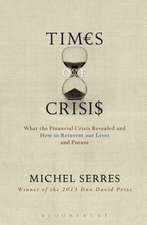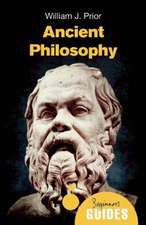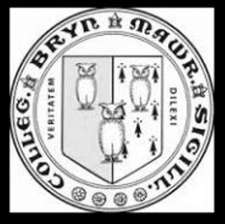Heidegger's Platonism: Continuum Studies in Continental Philosophy
Autor Dr Mark A. Ralkowskien Limba Engleză Hardback – 21 oct 2009
Heidegger's Platonism challenges Heidegger's 1940 interpretation of Plato as the philosopher who initiated the West's ontological decline into contemporary nihilism. Mark A. Ralkowski argues that, in his earlier lecture course, On the Essence of Truth, in which he appropriates Plato in a positive light, Heidegger discovered the two most important concepts of his later thought, namely the difference between the Being of beings and Being as such, and the 'belonging together' of Being and man in what he eventually calls Ereignis, the 'event of appropriation'.
Ralkowski shows that, far from being the grand villain of metaphysics, Plato was in fact the gateway to Heidegger's later period. Because Heidegger discovers the seeds of his later thought in his positive appropriation of Plato, this book argues that Heidegger's later thought is a return to and phenomenological transformation of Platonism, which is ironic not least because Heidegger thought of himself as the West's first truly post-Platonic philosopher.
Ralkowski shows that, far from being the grand villain of metaphysics, Plato was in fact the gateway to Heidegger's later period. Because Heidegger discovers the seeds of his later thought in his positive appropriation of Plato, this book argues that Heidegger's later thought is a return to and phenomenological transformation of Platonism, which is ironic not least because Heidegger thought of himself as the West's first truly post-Platonic philosopher.
| Toate formatele și edițiile | Preț | Express |
|---|---|---|
| Paperback (1) | 256.85 lei 6-8 săpt. | |
| Bloomsbury Publishing – 26 oct 2011 | 256.85 lei 6-8 săpt. | |
| Hardback (1) | 948.82 lei 6-8 săpt. | |
| Bloomsbury Publishing – 21 oct 2009 | 948.82 lei 6-8 săpt. |
Din seria Continuum Studies in Continental Philosophy
- 23%
 Preț: 179.10 lei
Preț: 179.10 lei - 31%
 Preț: 890.14 lei
Preț: 890.14 lei - 23%
 Preț: 262.25 lei
Preț: 262.25 lei - 31%
 Preț: 890.55 lei
Preț: 890.55 lei - 22%
 Preț: 949.17 lei
Preț: 949.17 lei - 14%
 Preț: 1007.12 lei
Preț: 1007.12 lei - 31%
 Preț: 889.88 lei
Preț: 889.88 lei - 22%
 Preț: 1007.12 lei
Preț: 1007.12 lei - 22%
 Preț: 888.58 lei
Preț: 888.58 lei -
 Preț: 256.02 lei
Preț: 256.02 lei - 22%
 Preț: 949.17 lei
Preț: 949.17 lei - 22%
 Preț: 948.91 lei
Preț: 948.91 lei - 22%
 Preț: 948.66 lei
Preț: 948.66 lei - 31%
 Preț: 891.51 lei
Preț: 891.51 lei - 22%
 Preț: 948.34 lei
Preț: 948.34 lei - 22%
 Preț: 256.49 lei
Preț: 256.49 lei - 14%
 Preț: 946.53 lei
Preț: 946.53 lei - 31%
 Preț: 890.72 lei
Preț: 890.72 lei - 14%
 Preț: 1005.98 lei
Preț: 1005.98 lei - 14%
 Preț: 889.88 lei
Preț: 889.88 lei - 14%
 Preț: 947.54 lei
Preț: 947.54 lei - 31%
 Preț: 947.54 lei
Preț: 947.54 lei - 22%
 Preț: 1005.41 lei
Preț: 1005.41 lei - 22%
 Preț: 947.11 lei
Preț: 947.11 lei - 23%
 Preț: 255.94 lei
Preț: 255.94 lei - 31%
 Preț: 948.34 lei
Preț: 948.34 lei - 22%
 Preț: 947.54 lei
Preț: 947.54 lei - 22%
 Preț: 946.53 lei
Preț: 946.53 lei - 22%
 Preț: 947.54 lei
Preț: 947.54 lei - 22%
 Preț: 889.39 lei
Preț: 889.39 lei - 22%
 Preț: 257.50 lei
Preț: 257.50 lei - 22%
 Preț: 1005.41 lei
Preț: 1005.41 lei - 31%
 Preț: 889.88 lei
Preț: 889.88 lei - 31%
 Preț: 947.94 lei
Preț: 947.94 lei - 22%
 Preț: 947.11 lei
Preț: 947.11 lei - 22%
 Preț: 947.86 lei
Preț: 947.86 lei - 14%
 Preț: 891.51 lei
Preț: 891.51 lei - 22%
 Preț: 948.10 lei
Preț: 948.10 lei - 31%
 Preț: 891.36 lei
Preț: 891.36 lei - 22%
 Preț: 1005.72 lei
Preț: 1005.72 lei - 31%
 Preț: 888.97 lei
Preț: 888.97 lei - 14%
 Preț: 947.54 lei
Preț: 947.54 lei - 19%
 Preț: 373.30 lei
Preț: 373.30 lei - 11%
 Preț: 373.30 lei
Preț: 373.30 lei - 22%
 Preț: 1007.62 lei
Preț: 1007.62 lei - 22%
 Preț: 1005.72 lei
Preț: 1005.72 lei - 22%
 Preț: 946.53 lei
Preț: 946.53 lei - 22%
 Preț: 948.34 lei
Preț: 948.34 lei
Preț: 948.82 lei
Preț vechi: 1367.06 lei
-31% Nou
Puncte Express: 1423
Preț estimativ în valută:
181.56€ • 189.95$ • 150.82£
181.56€ • 189.95$ • 150.82£
Carte tipărită la comandă
Livrare economică 02-16 aprilie
Preluare comenzi: 021 569.72.76
Specificații
ISBN-13: 9781441184894
ISBN-10: 1441184899
Pagini: 240
Dimensiuni: 156 x 234 x 14 mm
Greutate: 0.5 kg
Ediția:New.
Editura: Bloomsbury Publishing
Colecția Continuum
Seria Continuum Studies in Continental Philosophy
Locul publicării:London, United Kingdom
ISBN-10: 1441184899
Pagini: 240
Dimensiuni: 156 x 234 x 14 mm
Greutate: 0.5 kg
Ediția:New.
Editura: Bloomsbury Publishing
Colecția Continuum
Seria Continuum Studies in Continental Philosophy
Locul publicării:London, United Kingdom
Caracteristici
Concentrates particularly on Heidegger's work between 1931 and 1940, during which time his philosophy underwent profound changes.
Cuprins
1. What is Platonism?
2. Untying Schleiermacher's Gordian Knot
3. The Context of Heidegger's Interpretation of Plato
4. Heidegger's Platonism
5. Heidegger's Crisis and Opportunity
6. Revolutionary Thinker or Utopian Social Engineer?
7. Back from Syracuse? Four Reasons to Rethink Heidegger's Politics
8. How Heidegger Should Have Read Plato
Bibliography
Index
Recenzii
"Mark Ralkowski is an insightful thinker and a lucid writer, and he makes a powerful case here for taking the deep parallels between Plato and Heidegger seriously ... His book is critical and yet beautifully written, and draws ecumenically on the best resources of all the important traditions involved. This is no mean feat, but the creative product of a mature and highly disciplined philosophical mind." - Iain Thomson, University of New Mexico, USA, author of Heidegger on Ontotheology: Technology and the Politics of the University (Cambridge UP, 2005).
"An extraordinarily lucid and accessible study of Heidegger's (mis)reading of Plato that transforms our view of both philosophers in offering us a Plato nothing like the utopian and dogmatic metaphysician of the textbooks and a Heidegger whose later thought was heavily indebted to the Greek philosopher but whose politics failed to learn from him a most important lesson: humility." - Francisco J. Gonzalez, University of Ottawa, Canada
In this fresh and provocative work,a clear and concise study of interest to readers of Plato and Heidegger, Mark Ralkowski offers much food for thought. He shows a sound understanding of the principles of Plato interpretation, reviewing crucial phases or schools of Plato interpretation from Schleiermacher to the present. This is an important task in coming to terms with Heidegger's relationship to Plato.
"An extraordinarily lucid and accessible study of Heidegger's (mis)reading of Plato that transforms our view of both philosophers in offering us a Plato nothing like the utopian and dogmatic metaphysician of the textbooks and a Heidegger whose later thought was heavily indebted to the Greek philosopher but whose politics failed to learn from him a most important lesson: humility." - Francisco J. Gonzalez, University of Ottawa, Canada
In this fresh and provocative work,a clear and concise study of interest to readers of Plato and Heidegger, Mark Ralkowski offers much food for thought. He shows a sound understanding of the principles of Plato interpretation, reviewing crucial phases or schools of Plato interpretation from Schleiermacher to the present. This is an important task in coming to terms with Heidegger's relationship to Plato.
Notă biografică
Mark A. Ralkowski teaches philosophy at the University of New Mexico, USA. He edited Carol J. White's Time and Death: Heidegger's Analysis of Finitude (Ashgate, 2005).
